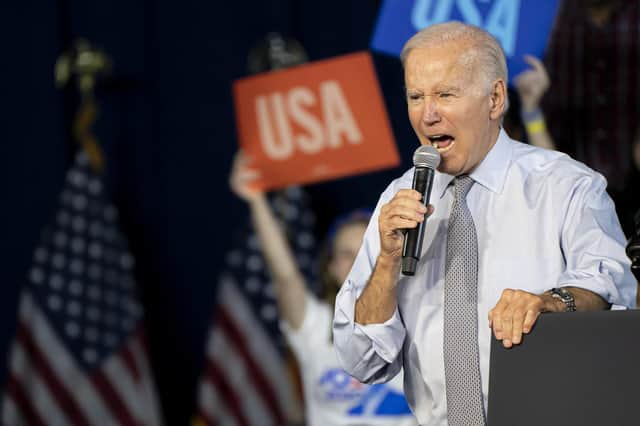US midterm elections: Joe Biden's Democrats give hope to centre-left politicians everywhere that right-wing revolution can be defeated – Joyce McMillan


Once-marginal Florida had voted heavily for Republican Governor Ron De Santis, both houses of Congress would probably see Republican majorities, and it seemed that Joe Biden’s presidency was dead in the water, as the now orthodox narrative of inevitable right-wing gains, and social democratic losses, was rolled out for the umpteenth time in recent years.
So it was a strange feeling to wake up, on Wednesday morning, to the news that things had not, after all, gone so badly, for the global centre left. It’s not that the threat of Republican majorities in both houses of Congress has disappeared; both could still happen, once all votes are counted, and every run-off completed.
Advertisement
Hide AdAdvertisement
Hide AdYet at a time of soaring inflation and huge economic anxiety across the United States, Joe Biden has somehow succeeded, with his party, in restricting midterm Democratic losses to a mere handful of seats – fewer than a dozen – across both houses of Congress, whereas a more popular Barack Obama, back in 2010, lost almost 70 midterm seats. It’s already clear that factors were in play which prevented the usual iron rule of American politics – that the party in the White House suffers heavy midterm losses – from operating with its usual force; and those interested in halting the recent rise of hard-right politics in the West should therefore be giving careful thought both to what those factors might be, and to whether they find an echo elsewhere.
In the first place, it seems that while economic factors were extremely important in shaping the outcome of the election, they did not always play out as predicted. Americans are certainly concerned about the current cost-of-living crisis, and unimpressed by Joe Biden’s efforts to deal with it; but there seems, after decades of increasing inequality in America, to have been a certain reluctance, in some areas, to leap to the conclusion that the Republicans would handle it better.
Then secondly, despite the widespread view on Tuesday that Joe Biden’s emphasis on the future of democracy and the threat to abortion rights had little traction with voters, those issues clearly did play a key role in limiting the Republican advance. An exit poll suggested that while inflation was voters’ chief concern, identified as the key issue by 32 per cent, abortion rights polled almost as highly, at 27 per cent; and in states where propositions on abortion rights appeared directly on the ballot paper, the results were uniformly supportive of women’s right to choose.
While the future of democracy may not have been a widely voiced concern, it seems that many of Donald Trump’s militant “election-denying” candidates scored poorly; and Joe Biden’s controversial moves to invest in America’s transition to a low-carbon economy clearly failed to drive down support for his party, in an election which saw younger voters turn out in particularly large numbers, in some areas.
All of which offers an interesting sense of the kind of alliance that apparently can still help to stall the politics of the far right in its tracks, and has recently done so in countries as diverse as Brazil and Australia. There are, of course, many negative and ominous counter-examples. Yet out there in the haze of our apocalyptic times, we can nonetheless just see the shape of the reality-based politics that might trump the lies and manipulations of far-right propaganda based on myths and conspiracy theories.
It’s a centre-left politics based in the reality of recent struggles, over the last half-century, for women’s rights, gay and trans rights, and the right of black people to be treated as equal citizens; and above all, today, in the growing struggle of ordinary workers and hollowed-out communities everywhere to reclaim their fair share of the wealth increasingly looted from our economies by the hyper-rich, and to join the fight to save our natural environment, both local and global, from the imminent catastrophe of runaway climate change.
Citizens who engage with those struggles are, it seems, far more resistant to far-right propaganda than those who live lonely lives on social media or in from of the television screen; and they also – as was obvious this week – have one other campaigning advantage, in the strikingly irresponsible and undisciplined behaviour in power of many of those who are drawn to far-right politics in these times. Undoubtedly, Donald Trump’s dangerous misconduct at the end of his presidency, following Joe Biden’s election, has damaged the Republican brand for many in “middle America”; and his petulant inability to acknowledge the success of others, even in his own party, now seems set to damage it further.
Add to this the unedifying recent shambles of Tory government in the UK, under the influence of right-wing Tufton Street lobbying organisations, and it’s clear that even bland and cautious centre-left leaders like Joe Biden and Keir Starmer can often benefit greatly from the sheer bad behaviour of the right-wing parties they face, and from the factionalism that currently plagues them.
Advertisement
Hide AdAdvertisement
Hide AdThe politics of co-operation and decency may be boring, in other words, and far from adequate to the demands of the hour. The events of this week, though, show that voters are perhaps not quite ready yet to tear up every democratic gain of the last century, and every decent impulse towards social equality, justice and compassion, in favour of some pseudo-radical right-wing revolution that will further enrich the rich, oppress those already in trouble, and finally burn us all. And that result offers the shreds of hope on which we can still try to build a decent future; along with some signposts as to the direction we should take, and the places where we may find our greatest strengths.
Comments
Want to join the conversation? Please or to comment on this article.
